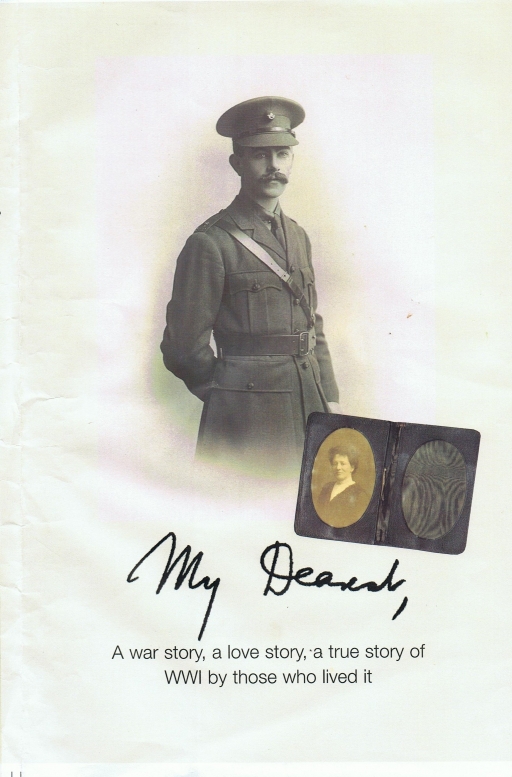An author from Kent in the UK, Aura Hargreaves, has compiled a book and website featuring the letters sent between her grandfather, a 2nd Lieutenant in the Kings Royal Rifle Corps, and his fiancee – written between 1915 and 1919. In this article for Centenary News, Aura Hargreaves explains the background to the book.
My Dearest
Thirty five years ago the Beckenham house I live in passed to me when my Grandfather, David Henry Taylor, died at the age of 92. He and my Grandmother, May (nee Muggridge), had built the house just after WW1, and my mother, their only child, grew up in the house.
When we moved in and started clearing up, I found bundles of letters in various drawers and cupboards and a quick look at them made me realise that they were personal letters from Grandfather to Grandmother, and hers to him, when he was a soldier in WW1.
I was close to my Grandfather and found reading them made me very emotional, so I just put them, and other letters and documents I found, all together in an old filing cabinet.
Published
About 25 years ago I had the idea of getting them published but got no interest from the publishers I approached. Then, last year, I thought that the 100 year anniversary of the start of WW1 was a good time to try again to get them published and started work on digitising the letters in to a readable format.
It was not until I started work on the project in the spring of last year that I realised what an amazing archive we had: there are over 400 personal letters, not just those from David to May and May to David, but from David’s mother Fanny to his sister Ethel (nickname Ginger) who lived in the USA (these letters must have come back to England after the War), letters from Ethel to David, various letters from soldiers in David’s platoon to Ethel thanking her for socks and cigarettes, letters from David’s senior officers to his mother Fanny when he was missing after a big battle on the Western Front, a couple of letters from David’s old headmaster at St Olave’s to David, one or two letters from family friends to Fanny, and even a couple of letters to May from the mother of a soldier in David’s platoon who had been killed.
Documents
As well as the collection of letters, I found a variety of documents supporting the ‘story’ in the period between September 1915 and March 1919 when David was finally demobilised. These include various Army documents and forms, copies of book orders sent to David as a prisoner of war in Holzminden PoW camp, and a number of postcards with pictures of war damage in France and Belgium. We even have a couple of books and a picture that came back with David from Holzminden. We also have photographs of all the main correspondents, and David’s medals and sewing kit with spare uniform buttons.
Most of the letters are with their original envelopes, supporting the dates and locations, as well as providing evidence of the heavy hand of censorship.
Both David and May wrote very well, in great detail, quite often with humour. May was the most senior woman in Northern Assurance in London so the letters provide a wide range of information (despite the censors) about David’s daily life as a soldier and also those at home in London.
May’s views about office politics at the time make one think that nothing much has changed in 100 years!
Stories
There are also smaller stories within the larger one, about officer training with the Artists Rifles, a couple of very moving ones about the death of May’s brother Bert while serving as a signalman on the Western Front, and the death of Hebberden, a soldier in David’s platoon who died in a shell hole while trying to help his fellow soldiers.
As a mother myself, I was especially touched by a series of letters over a period of several weeks when David was missing, known to be wounded, possibly dead, from mother to sister, expressing her anxiety and grief, and describing what steps she is taking trying to find out his fate.
There has already been a historical discovery from the letters: the word ‘banger’ (exploding sausage) was first used in 1918 in the Holzminden PoW camp.
Book
We have reproduced the whole archive in hardback book format with the title ‘My Dearest’ (ISBN 978-0-9929965-0-5) and are now working on plans for making the archive more widely available, by providing the website www.ww1-letters.com on which we plan to produce scans of all the letters with transcriptions, probably on a daily basis 100 years on from their original date, which will take us from September this year until March 2019.

Excerpt from the letters
Article Copyright: the author and Centenary News
